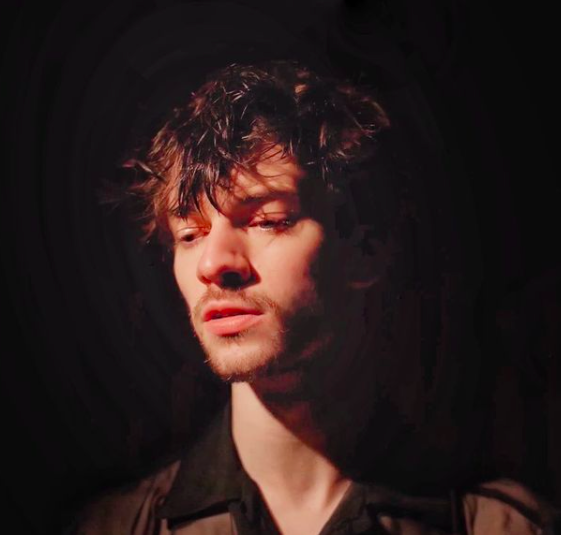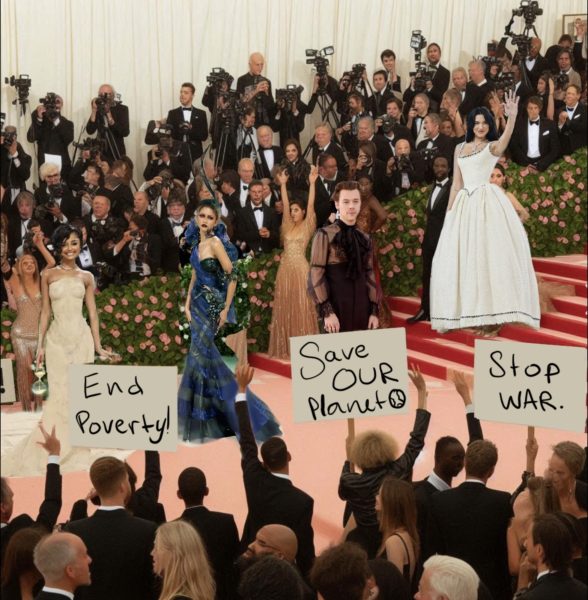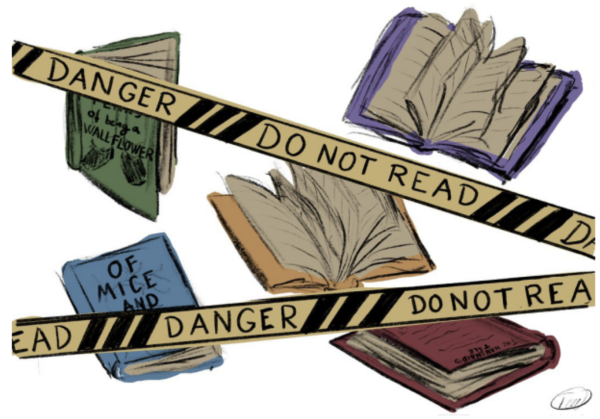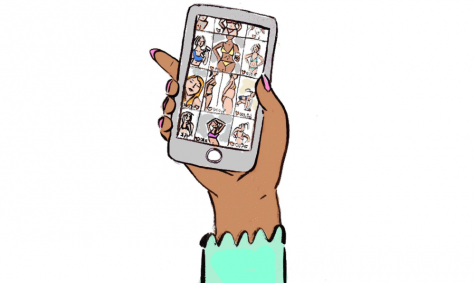Interview with Sean Lìonadh
Both Mark and I did not expect to be having this conversation with Sean. We expected to have a run-of-the mill conversation about his art. We did eventually have that, but that is not what has been kept for this interview. What has been kept is an honest reflection of what it means to be queer in an environment that does little to support other identities. We hope this shows many straight members of the ISL community the lived experience of many of their peers.
Tanvi Anand
Thank you. So actually, Mr Ivett had mentioned, just to give you some background, both of us write for the school newspaper, it’s called The High. I’m the Editor-in-Chief at the moment and I was thinking of using our platform to put queer voices front and centre for this new issue, because things are rough for queer students at ISL, to put it bluntly. I’ll send you an article that a student wrote anonymously now, just to give you an idea of the situation in our school.
Sean Lìonadh
After reading the anonymous op-ed. Wow. That’s really powerful. And I’m really sorry to hear that after my visit, you know, two years ago. It seemed like such a welcoming place to me, you know. Mr Ivett said that the population of the school changes quite a lot, you know, from year to year, so it’s hard to maintain that kind of culture. But yeah, it’s really sad to hear that that level of, you know, emotion is going on unrecognised by students. And it’s really impressive that that has been published so that, I think you’ve got a really good tool to represent its students. So yeah, that seems not too far from what my experience was at school. I went to a Catholic school and, I mean, there was absolutely no chance anyone was ever going to come out or even discuss, you know, like it was, it was a slur, you know it was like… there was quite open bigotry going on, and the word gay was just thrown around as an insult and a way to defame someone.
And, so it’s sad that that experience seems not too far from mine, but… do you personally relate to that article?
TA
I think in this school there’s a really weird dichotomy between these progressive teachers and then these very conservative students, and I think part of this is like the role of cultural relativism. I think, because we’re an international school, there’s a myriad of voices. And I feel like, because it’s an international school, there’s not one homogenous culture, and it seems that sometimes the culture that’s the loudest is kind of this white male super-macho type culture; it flows everywhere, from the discussions in the changing room, to the extremely gendered… to the extremely rigid gender norms, and things like that. But, as you had mentioned, our school changes a lot because it’s an international school, so nothing is really fixed. And of course, the culture just changes so much. So yeah, I do relate to this article. I mean, of course, the person who wrote this article has not come out publicly, but when you do come out in a school like this, you do not necessarily face violent threats, but there are these hidden microaggressions and stigmatizations that take place.
SL
It’s interesting because I think that even in an ideal world, coming out is always going to feel like a massive choice to make, you know, and people are always going to have to adjust to their perspective – their new perspective – of you as, you know, your authentic self. So I think queer people are always going to carry that burden of being authentic in a place that is, sometimes, very threatening to that, but I think that makes us also one of the strongest examples of that journey which everyone really has to go through in some degree, you know, of being vulnerable and being authentic and opening rather than closing yourself to the world. So I think the LGBT experience is one of the strongest examples of being vulnerable and being authentic.
I think it’s an experience everyone can relate to because as much as it’s easy to separate the world into, you know, gay, bisexual straight, white, dark; we are all part of the human experience and I think that a lot of aggression – especially masculine aggression, white masculine aggression – comes also from a place of feeling unheard or feeling unable to be vulnerable. Which is not an excuse for that behaviour is just, I think, the way that I see it, you know. So it takes a lot of courage to be authentic in that environment and, as I have said already, it sets an incredible example. It’s just sad that that decision is followed by having to constantly, you know, defend oneself, which really is… When you have to constantly defend and feel like you’re constantly going to war in an environment, it’s really hard to just, you know, step back and just stay open. There can be a lot of… coming out is like a long sort of slow, difficult journey. You know from the moment you first open up, it’s so tempting to just run back in so it takes courage on pretty much every moment of every day that you’re in that environment. And that’s where storytelling I think is so valuable because – I know that that article touches on certain media, you know, maybe misrepresenting how easy it is – I think there is also a lot of really good media, whether it’s fiction or non-fiction, that can be more useful, and I think the great thing about storytelling is that it makes the queer person the hero, you know. It puts them in a place that invites any viewer to engage with and to soften to that experience instead of, you know, hardening to it and othering that person; suddenly they’re presented to you as a human being, and the story invites you in, you know. I think that’s why media is so phenomenally powerful, in today’s world. But then it may have been that people in your school have been exposed to that media and still haven’t, you know, it’s difficult to tell. But do you? Do you think microaggressions are a big problem in your school and what kind of form do they take?
TA
The biggest manifestation of homophobia, I think, comes from the PHE changing room. I remember multiple times you would enter the changing room and a girl would be like: “Do you reckon there are any lesbians in here? I wouldn’t want them to see me changing.” But it’s not only that, I think in our current… With the rise of social media and things like that, there are certain unsavoury voices that always get pushed to the limelight because, of course, if you’re controversial, you’re pushed forward. So there’s the use of the word sus instead of gay. Today’s vocabulary has changed, people don’t know each other gay to insult people, they call each other sus. [SL: Wow] So that’s a big one, the use of the word sus. And teachers, of course, don’t know what it means. A boy in my math class asked, “Do you think I’m sus?” and I thought it meant suspicious and I said “maybe, sometimes” and then he got fairly offended and then I realised what it had meant… the fact that they just use it so casually is crazy.
SL
Oh, that is really… horrible and really enlightening actually that that’s the way that the conversations going because that’s effectively equating homosexuality with something suspicious. In a way, it’s kind of more honest about, you know, it brings these attitudes into the light and shows them for what they are, which is effectively like discomfort, you know. But now I’m imagining, like ‘Among Us’ you know the game with like the…
TA
Yes, and I think that’s where it comes from…
SL
Is that what it’s from? Oh my god, I actually love that game, I’m so sad about what it’s like. Wow. I mean, if it’s any consolation, I love to be the impostor much more than I like to be the crewmate because it means I get to, you know, it’s much more enjoyable to be sus, but… Yeah, that’s quite… It shows that there is an intelligence, almost, underneath that homophobia… But I think in many ways that is largely immaturity, you know, and it’s sad that you have to mature beyond homophobia because really it should never arrive in your… like, as a child you would hope that it never arrived in you in the 1st place, but in the world we live in, of course it does then. And I think that as you say, because it’s such a temporal space and people are constantly passing through. It is a good thing on one hand that you do have such a non homogeneous, you know, culture. The language has, you know, shifted to a place… well, It’s, it’s the same thing really, ultimately. But it’s just adapting, which is slightly worrying. I’d love to be able to provide a cure that works for everyone and to deal with homophobia, but I have been thinking a lot recently about how racism and homophobia really is the problem. For the people it’s created by, you know, racism isn’t really something that me, as a white person, should ask a black person to fix. You know, racism is a problem created systemically by white people, so really, it’s my problem and I think it’s the same with homophobia. We provide the experience which you know gives heterosexual people reason to tackle homophobia. Because, you know, this is how it makes me feel like that’s a really useful tool. But, at the same time, it’s kind of up to the establishment to fix the problem that they’ve created, you know?
So I have been thinking about that a lot recently, but obviously they’re probably not going to do it, so we have to just keep pushing. You know, causes require a lot of voices behind them to support them.
TA
No, I think that that’s completely right. bell hooks, one of my favourite feminist scholars, speaks about a white supremacist, capitalist patriarchy. All these systems of domination work with one other…
And I completely agree. I feel that sometimes in this school it is kind of left to people of colour to point out microaggressions and be the first to “blow the whistle”.
SL
From the literature, I’ve read, you know, like it’s not enough to be not racist, you have to be actively anti racist, you know. And it’s the same with homophobia. You have to be an advocate: consistently against homophobia. I was watching an interview with Emma Thompson today about, it was an old interview about the #MeToo movement and Harvey Weinstein. All those claims first came out and she said: How do we fix it? You just call it out all the time, every time it happens.
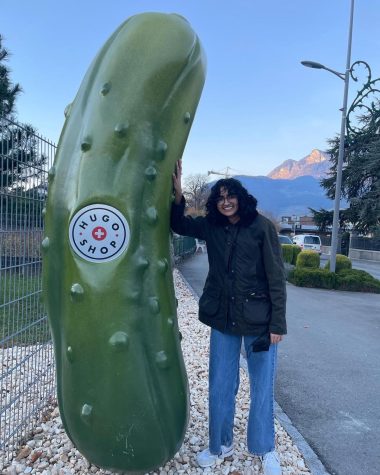
I’m Tanvi, Editor-in-Chief of The High. I’m The High’s resident pretentious music snob™, which is a title that I take very seriously. When...


